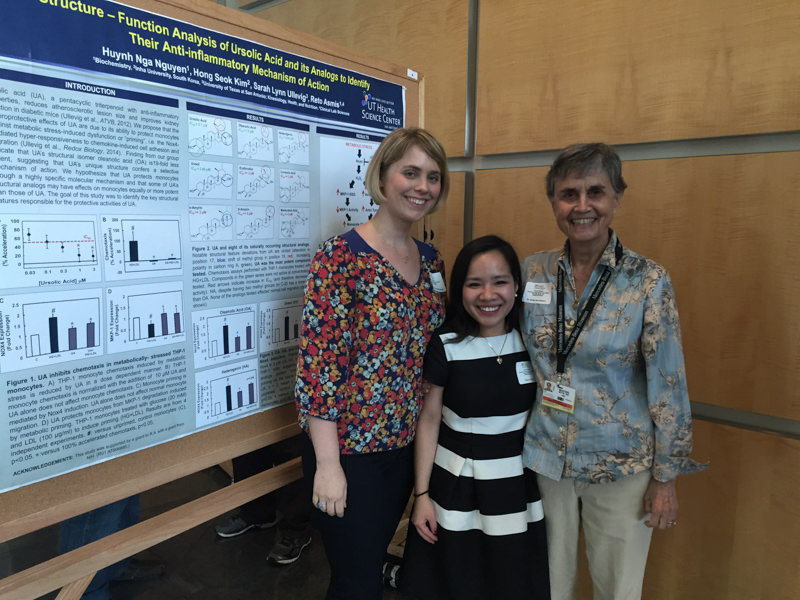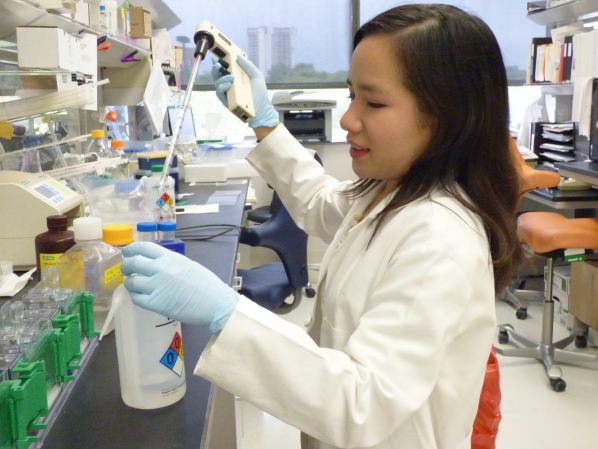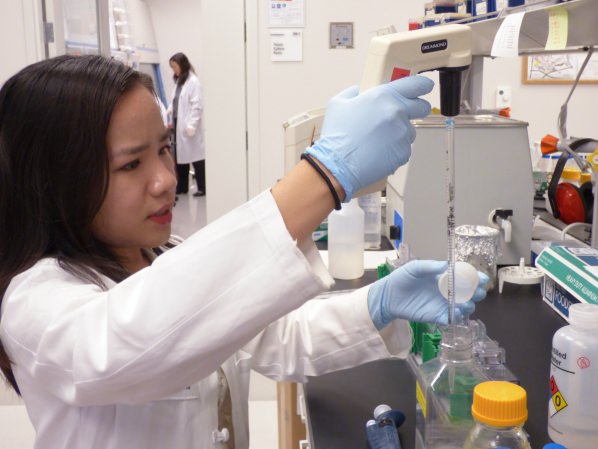Nancy Nguyen Works To Find Therapeutics For Cardiovascular Disease
 Nancy Nguyen has always been interested in nutrition and
Nancy Nguyen has always been interested in nutrition and
metabolic disease. When she met Dr. Sarah Ullevig, a registered dietitian and graduate student in Dr. Reto’s Asmis lab, she knew that that was the lab for her.
“I had a really great first impression of the lab and of Dr. Asmis so I joined the lab soon after I rotated,” Nguyen said. “Every lab member worked well together and the current
projects aligned with my interests.”
She is currently investigating the effects of the phytochemical ursolic acid as an anti-atherosclerosis treatment and was recently awarded an American Heart Association Predoctoral fellowship. This competitive grant allows her to further investigate the effects of phytochemicals on atherosclerosis, addressing the AHAs mission to improve lives using science based treatments.
Nguyen was also selected for the prestigious Translational Science Training (TST) TL1 Scholar Award along with Elizabeth Fucich, Mariam Ishaque, and Travis Block from the UTHSCSA’s Institute for Integration of Medicine and Science (IIMS).

“Current treatments for atherosclerosis aim to reduce inflammation and oxidative stress to prevent or inhibit atherosclerotic lesion
formation,” Nguyen said. “In the U.S., cardiovascular disease is the number one
cause of death in African Americans, Caucasians, and Hispanics. Health care costs and lost productivity from heart disease results in an estimated $320 billion toll on the economy. So, it is crucial that we find low-cost treatment options.”
Her research has found that the naturally occurring phytochemical ursolic acid (UA) protect diabetic mice from cardiovascular disease.
“UA has many reported activities, from inhibiting tumor formation, inhibiting inflammatory pathways to reducing obesity and increasing glucose tolerance in diet induced-obese mice,” she said. “Although UA has been heavily investigated as an anti-cancer compound, it has more recently been explored for its anti-inflammatory benefits.”
The research shows that UA protects monocytes from metabolic stress induced dysfunction, a novel mechanism not currently targeted by commercially available CVD therapeutics.
“It would be great if UA could be used as a possible anti-atherosclerosis supplement,” Nguyen said. “We want to discover the mechanism of how UA works and then translate that into a therapeutic.”

Nguyen explained that funding from the award will help her explore new areas of study.
“I’m interested in testing phytochemicals related to ursolic acid as well. Since UA and many of its related analogs are found in natural sources like olive oil, it would be interesting to investigate the synergistic effects of these compounds.”
One of the aspects of the grant includes participation in a translational research class.
“The topics in translational research class has introduced me to what other groups are doing in terms of translational research and has given me great perspective on career options outside of academia like working in army research,” Nguyen said.
She would like to become a professor in the future and focus more on teaching than research.
“My long term goal is to provide insight into ursolic acid’s mechanism of action and its potential to translate into a therapeutic supplement for use in diabetic complications,” she said.
 This article was written by Charlotte Anthony, marketing specialist at the Graduate School of Biomedical Sciences at UT Health San Antonio. This article is part of the “Meet The Researcher” series which showcases researchers at the Graduate School of Biomedical Sciences at University of Texas Health Science Center San Antonio.
This article was written by Charlotte Anthony, marketing specialist at the Graduate School of Biomedical Sciences at UT Health San Antonio. This article is part of the “Meet The Researcher” series which showcases researchers at the Graduate School of Biomedical Sciences at University of Texas Health Science Center San Antonio.
